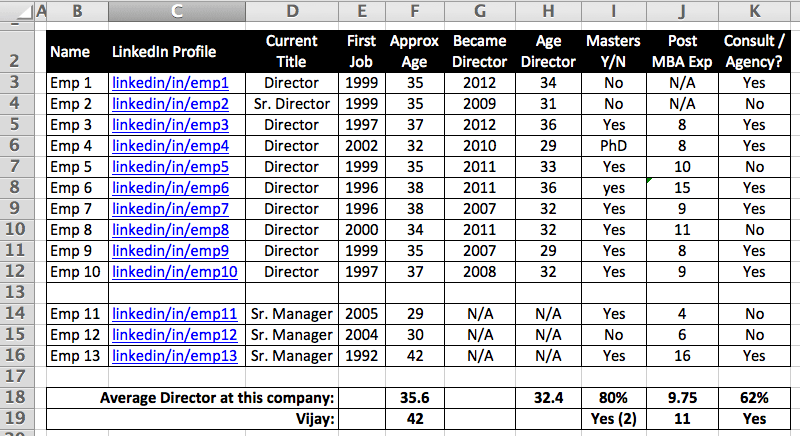Case Study: Prepare for your interview like a business analyst by using LinkedIn public data to increase your title and salary
Homework
For our entire childhood, homework seemed like a chore or even punishment.
“OK class, take out your homework!â€
“Go upstairs and do your homework!â€
“You’re not watching any TV until you’ve finished your homework!â€
Aw, mom.
But there’s a reason your parents and teachers insisted on this extra activity. When taken seriously, the extra work and practice prepares you to excel in a given task, be it algebra or literature.
“Do your homework†is also the first thing any expert will tell you when preparing for a job interview or salary negotiation.
Unfortunately, like an antsy teenager hoping to get back to a game of Call of Duty, the average job-seeker just looks over the basics when preparing for a negotiation. Sure, they might check some competitive salaries online, talk to a friend or two, or have some dollar figures in mind, but are they really, truly prepared?
Enter Vijay, a business analytics manager at a major internet company.
Not only did Vijay prepare for an interview by creating a customized salary negotiation document like I recommend, but he went so above and beyond, that I asked him if I could share his story.
Making a jump in title
One of the most difficult things to do in the corporate world is to make a significant jump in title. Companies are happy to hand out smaller increments, such as going from assistant manager to manager, or from manager to senior manager.
However, the big jump in title – and also in salary – is making the leap from manager level to director level, or from director level to Vice President.
In many companies, bestowing a director title on an employee comes with many add-ons:
- Management of other employees and even entire departments
- Autonomy to make business decisions and control budgets
- Eligibility for bonuses and additional stock options
The problem is convincing someone you are ready to make that jump.
- If you have been a manager at your current company for some time, it’s very easy for your boss to keep stringing you along with “We just don’t think you’re ready yet, maybe at your next review†for months or even years on end.
- If you go looking for a director level position at another company, it’s much easier for them to hire someone else that already has director in their title, vs. taking a chance that you’re ready to handle moving up a level.
The money on the line can be significant.
According to online data, the median “Manager†position pays $85,000 nationwide, while the median “Director†position is $127,000 – a difference of 50%.
Tapping into LinkedIn data
As a Senior Manager, Vijay’s situation falls into both categories above. While satisfied with his current job, he feels that he is a top performer at his company and is aiming for a promotion within the next six months. He wants to be able to prove his worth.
He was also approached by an outside company with an open Senior Manager position, which would interest him only if he were able to negotiate a title at the Director level. Wisely, he’s not interested in making a lateral move.
What he did was create a spreadsheet based on public LinkedIn data at the new company for every employee with a Director level title.
He included the following items:
- Employee name and a link to their profile (hidden here)
- Exact title (Director or Senior Director)
- Year of the person’s first job
- Approximate age
- Year the person was named Director
- Approximate age they became Director
- Whether or not they had a Master’s degree
- Number of years experience since their Masters
- If they had a consulting / agency background
The first caveat of course, is that this is all self-reported data.
Various surveys have shown that anywhere from 8% to 53% of people lie on their resume, so there’s a chance that someone didn’t quite finish that MBA or made an honest mistake and said the start date of their first job was early 1998 when it was actually late 1997.
But using this as directional data, he was able to deduce:
1. The average age of a Director was 35.6
2. The average age they became Director was 32.4
3. 80% of the Directors had a Masters degree
4. The average number of years post-Masters was 9.75
5. 62% of Directors had agency or consulting experience (asked for in the job description)
How can Vijay use this to his advantage?
At the bare minimum, he can illustrate that his qualifications match up incredibly well with what a Director at that company looks like.
He has more than 10 years experience, has not one but two MBAs, has relevant management experience, and has the desired consulting and agency background that many of the current Directors do not.
Digging into salary data
As you can guess by now, Vijay wasn’t content with saying “Well, I’m making X dollars now… it would be nice to get a 10% raise at my next position.â€
On the contrary, he detailed out a spreadsheet with industry-related salaries from Salary.com, as well as specifically reported salaries from the company he was looking at from another website.
He analyzed the following:
- Salary, bonuses, cash bonuses, and stock bonuses
- High, low, and average figure at each level
- What the predicted stock price for his current and potential employer would be for 2012, 2013, and 2014
- Predicted raises at his current position over time
- How much he would be giving up if leaving his current position
- Since the new position would be in 1 of 2 locations, he accounted for moving costs, state taxes, and cost of living difference
- Lifestyle factors for his family based on location, weather, etc.
Four Key Takeaways
1) Aim for the right title
It’s one thing to bring general industry data to an interview; it’s another to be able to cite specific data from their own company. Of course, it’s important to present this in the right way. It should never be confrontational or boasting, and keep the numbers aggregate – don’t list out individual employee names and data.
However, Vijay can make a very strong argument that he is deserving of a higher title. If the average Director has 7-10 years experience, he demonstrates his worth by highlighting his 10 years experience as a top performer, plus an MBA, management experience, and a consulting background.
Data can also show if you are severely undervalued.
During the analysis, Vijay pulled a few examples of Senior Managers at the company. While two of them had 4 and 6 years experience, respectively (about half of the average Director), there was a third employee with a whopping 16 years experience – more than any other person analyzed. All things being equal, clearly this was someone who could make a rock solid case for a promotion in comparison with their peers.
2) Target the correct salary
There are many things that factor into a total compensation package. If your area of business offers bonuses and stock, make sure to take those into account, both in current dollars and looking forward several years.
3) Demonstrate who you are
Should everyone walk into his or her interview armed with a 3-ring binder of extensive research? No. This might not be the best course of action for many professions.
But here is what stood out most to me: He is a business analytics specialist.
Do you understand what I’m getting at???
The potential employer will be paying him to be the best possible person at researching and analyzing statistics and trends, day in, day out, for the next several years.
Doing this incredible amount of detailed work and analysis for his interview is a pretty strong indicator that this is one of his greatest strengths. He is doing a deep-dive business analysis for his interview, because it’s in his nature … he is a business analytics guy.
Do I have to quote Terminator for you? Why yes I do.
“You still don’t get it, do you? He’ll find her! That’s what he does! That’s ALL he does! You can’t stop him!â€
You should do the same in your job. When you walk into that interview, if you’re a talented designer, you better have some design elements in your portfolio. If you’re a website developer, you better have an awesome personal website. If you’re a Search Engine Optimization specialist, you better be near the top of Google results.
In other words, walk the walk.
4) Your mom was right. Do your homework.
As you can see, Vijay is an incredibly smart, incredibly prepared individual that took his job search very seriously, knowing that the work he was investing could pay off in terms of a higher title and potentially tens of thousands of dollars in return.
Despite all his knowledge and preparation, he realized that hiring a salary negotiation coach to make sure he had all of his bases covered and to have someone as a sounding board was also a no-brainer investment.
I had a great time working with Vijay, and would love to work with you as well. Contact me if you want to find out if we’re a good fit.
Note: A version of this article first appeared in a post for Salary.com.





